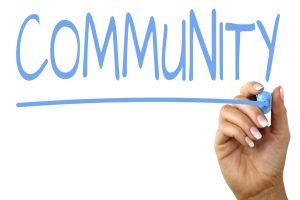In Praise of Our Communities
“In the beginning was the relationship,” said a former colleague at Phillips. Not the individual, but the relationship is the fundamental building block of human life. Contemporary understandings of physics and biology largely share the same perspective: individual elements and entities are separate only for analytical purposes. In reality, relationships and community are of first-order importance.
The connection Christians have to Jesus of Nazareth and to the Risen Christ is the community, not the Bible. The community (or communities, but I’m going to stick with the singular) wrote the Bible and continued its telling, reproduction, and then (after the printing press) production. The Bible represents a community of communities.

Christian communities embody and express their understanding of Jesus. Yes, there are malformed persons who refract Jesus through a sick soul. And there are heroic persons, prophets, who declare that the community has become distorted and risk the community’s ire to say, “No! Not the way! Here, here is the path.” But both the malformed and the exemplars are rooted in community.
Theologian and ecumenist Albert Outler wrote that community precedes doctrine. I understand this to be a teaching akin to “the sabbath is made for humankind and not humankind for the sabbath.”
Anthropologists remind us that humans take longer than most (if not all) other species to mature, and we cannot mature properly without being enculturated and without being held and beheld—face to loving face—by others. It takes a community to raise a child.
The preamble to the U.S. Constitution begins with “We the People,” not “I and other self-interested and self-made individual consumers.” The reasons (common welfare, justice, defense) for forming “a more perfect union” are community goods and belong exclusively to no individual.
Trinitarian Christians understand God as a community of three distinct yet interwoven Persons engaged in an eternal unbroken dance of love.
Love makes no sense apart from community. Neither does truth, goodness, compassion, kindness, forgiveness, forbearance, patience.
Liberty, the freedom and the power to shape one’s own life and world, is not a standalone value. Liberty exists in relationship to other values such as equality, mutuality, equality, and equity. Liberty as practiced must be understood, then, within the framework of a community of other persons and is thus tempered by other values.
One can and should advocate for a richer sense of public in the U.S. because of these understandings. That is what I am doing.
Based on these understandings, the social philosophy to which I most closely align is communitarianism. I believe that community, relationships, and moral ties are fundamental to the formation of persons. The isolated individual per se is a fiction. Rights belong to individuals but are interpreted, delimited, and exercised in a community of persons.
My understanding of communitarianism is based in my religious values and in the observations of contemporary sciences: in the beginning was the relationship.
None of this means I am a socialist, if by socialism one means massive government control of industry and control of who profits from what. (As the Senate and House debate the support package to help the country get through the pandemic, one might be forgiven for gagging on the contradictions of capitalism and capitalists SO on display.) I am a communitarian, and that does not fit tidily into pre-formed political or economic molds.
The combination of overpowering partisan political identities plus faith communities that either provide a sacred canopy for the status quo or function with voices too small to be heard means we are experiencing a failure of spiritual/religious rhetoric. We can’t imagine a political, social, economic language to deliver ourselves. (As I’ve said in these blogs a time or two, there is one outstanding exception to my statement.)
I am a person of Christian faith who is looking to my faith tradition, as well as the traditions of other faith communities, for strands of a different way.
To sum up what I’ve written above: strong, resilient societies require many strong, resilient communities in which persons are formed into decent human beings. Decent human beings pay attention to the moral question of what we owe to each other and to the mutuality of our civil rights.
Community life is supremely important for living a good life. I am reminded of this importance as I see empty houses of worship, deserted streetscapes, silent ballparks, darkened offices, unappreciated art, and shuttered restaurants.
Life is relationship-based. Let us praise and strengthen our communities—and which communities are included in “our.”
IMAGE CREDIT: The Blue Diamond Gallery under Creative Commons 3 – CC BY-SA 3.0 license.


Leave a Reply